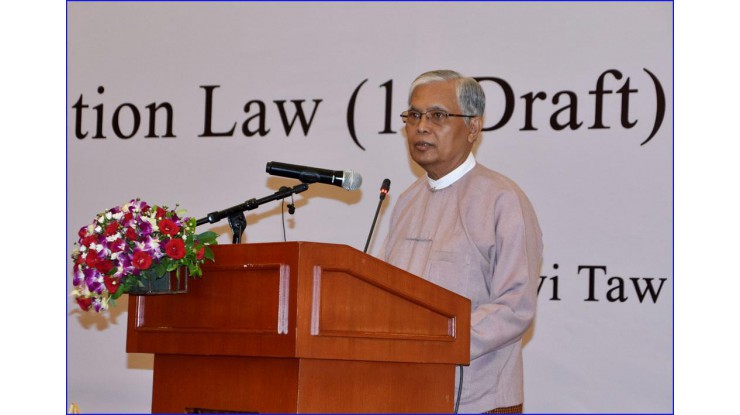ထုတ်ဖော်သတင်းပေးသူများအား အကာအကွယ်ပေးရေး ဥပဒေကြမ်းပြုစုရေး အလုပ်ရုံဆွေးနွေးပွဲ၌ပြောကြားသော အဂတိလိုက်စားမှုတိုက်ဖျက်ရေး ကော်မရှင်ဥက္ကဋ္ဌ၏ အမှာစကား
- Fri, 17 May 2019

ထုတ်ဖော်သတင်းပေးသူများအား အကာအကွယ်ပေးရေး ဥပဒေကြမ်းပြုစုရေး အလုပ်ရုံဆွေးနွေးပွဲ၌ပြောကြားသော အဂတိလိုက်စားမှုတိုက်ဖျက်ရေး ကော်မရှင်ဥက္ကဋ္ဌ၏ အမှာစကား
အလုပ်ရုံဆွေးနွေးပွဲသို့ တက်ရောက်လာကြပါသော ကော်မရှင်အဖွဲ့ဝင်များ၊ ပြည်ထောင်စု ဝန်ကြီးဌာနအသီးသီးမှ တာဝန်ရှိသူများ၊ UNODC မှ မြန်မာနိုင်ငံဆိုင်ရာကိုယ်စားလှယ်နှင့် အဖွဲ့ဝင်များ ၊ UNDP ရုံးခွဲမှ ကိုယ်စားလှယ်နှင့် ဧည့်သည်တော်များအားလုံးကို မင်္ဂလာအပေါင်းနဲ့ ပြည့်စုံပါစေကြောင်း ဆုတောင်းမေတ္တာ ပို့သအပ်ပါတယ်။
ပြည်ထောင်စုသမ္မတမြန်မာနိုင်ငံတော်ဟာ ၂၀၁၂ ခုနှစ် ဒီဇင်ဘာလမှာ ကုလသမဂ္ဂ အဂတိ လိုက်စားမှုတိုက်ဖျက်ရေးကွန်ဗင်းရှင်းကို အတည်ပြုလက်မှတ်ရေးထိုးခဲ့ပြီးနောက်၊ ဤကွန်ဗင်းရှင်းသည် မြန်မာနိုင်ငံအပေါ် ၂၀၁၃ ခုနှစ် ဇန်နဝါရီလမှာ စတင်၍သက်ရောက်မှု ရှိခဲ့ပါတယ်။ ဒါကြောင့် မြန်မာနိုင်ငံဟာ ဤကွန်ဗင်းရှင်း အပိုဒ် ၃၃ နှင့်အညီ “ သတ်မှတ် ထားသော ပြစ်မှုများဆိုင်ရာ အကြောင်းခြင်းရာတစ်ရပ်ရပ်နှင့်စပ်လျဉ်း၍ လုပ်ပိုင်ခွင့်ရှိသော အာဏာပိုင်ထံသို့ လုံလောက်သော အကြောင်းပြချက်များအရ သဘောရိုးဖြင့်သတင်းပေးသူ တစ်ဦးဦးအပေါ် မတရားသဖြင့် ပြုမူဆက်ဆံခြင်းမှ အကာအကွယ်ပေးရန် သင့်လျော်သော အရေးယူ ဆောင်ရွက် ချက်များကို ပြည်တွင်းဥပဒေစနစ်အတွင်း၌ ထည့်သွင်းပြဋ္ဌာန်းရန် အဖွဲ့ဝင်နိုင်ငံတိုင်းသည် စဉ်းစားဆောင်ရွက်ရမည် ” ဖြစ်ပါတယ်။
ထို့အပြင် ၂၀၁၈ ခုနှစ် ဩဂုတ်လတွင် ပြည်ထောင်စုအစိုးရအဖွဲ့က ထုတ်ပြန်ခဲ့သည့် မြန်မာနိုင်ငံရေရှည်တည်တံ့ခိုင်မြဲပြီး ဟန်ချက်ညီသော ဖွံ့ဖြိုးတိုးတက်မှုစီမံကိန်း (၂၀၁၈-၂၀၃၀) ၏ မဟာဗျူဟာ ၁.၄ - ကောင်းမွန်သောအုပ်ချုပ်မှု၊ အဖွဲ့အစည်းများ၏စွမ်းဆောင်မှုနှင့် အဆင့်တိုင်းတွင် စီမံအုပ်ချုပ်ရေးဆိုင်ရာဆုံးဖြတ်ချက်များ ထိရောက်စွာချမှတ်နိုင်မှု တိုးတက် ကောင်းမွန်ရေးဟူသော ခေါင်းစဉ်အောက်ရှိ၊ မဟာဗျူဟာလုပ်ငန်းစဉ် ၁.၄.၅ တွင် “နစ်နာမှုများကိုထုတ်ဖော်ခြင်းနှင့် တိုင်ကြားခြင်းစနစ်များ ပိုမိုကောင်းမွန်စေခြင်းအပါအဝင်၊ အဂတိလိုက်စားမှုတိုက်ဖျက်ရေးနှင့် သက်ဆိုင်သည့်ဥပဒေများ၊ သက်ဝင်ကျင့်သုံးမှုနှင့် မူဝါဒများကိုသုံးသပ်ရန် နှင့် ပိုမိုခိုင်မာလာ စေရန်”ဟုဖော်ပြထားပြီး၊ မဟာဗျူဟာရလဒ်အဖြစ် “ အစိုးရကဏ္ဍအသီးသီးတွင် ရိုးသားဖြောင့် မတ်မှုနှင့်တာဝန်ခံမှုမြင့်မားလာခြင်း” တို့ကို ရရှိစေရမှာ ဖြစ်ပါတယ်။ နစ်နာမှုများထုတ်ဖော်ခြင်း နှင့် တိုင်ကြားခြင်းစနစ်များကို Myanmar Sustainable Development Plan ( 2018 – 2030 ) ၌ “Strengthening grievance and whistleblower mechanisms” လို့ ဖော်ပြထားပါတယ်။ ဒါကြောင့်MSDPစီမံကိန်းအောင်မြင်ရေး အတွက်လည်း “Whistleblower Protection Mechanism” တစ်ခုကို ခိုင်ခိုင်မာမာတည်ဆောက် ပေးရန်လိုအပ်ကြောင်း တွေ့ရပါတယ်။ ဒီမဟာဗျူဟာလုပ်ငန်းစဉ် ၁.၄.၅ ကို အကောင်အထည် ဖော်ရန် သက်ဆိုင်တဲ့အဖွဲ့အစည်းကတော့ “အဂတိလိုက်စားမှု တိုက်ဖျက်ရေးကော်မရှင်”လို့ ဖော်ပြထားပါတယ်။ ကော်မရှင်အတွက် သက်ဆိုင်သည့်ရည်မှန်းချက်ကို ဖော်ပြထားရာမှာလည်း ၂၀၁၅ ခုနှစ် ကုလသမဂ္ဂအထွေထွေညီလာခံကချမှတ်ခဲ့တဲ့ စဉ်ဆက်မပြတ် ဖွံ့ဖြိုးတိုးတက်ရေး ပန်းတိုင် (SDG) ၁၆.၅ ဖြစ်ပါတယ်။ (SDG) ၁၆.၅ ဆိုတာကတော့ “အဂတိလိုက်စားမှုနဲ့ လာဘ်ပေးလာဘ်ယူမှုပုံစံအမျိုးမျိုးကို စဉ်ဆက်မပြတ်လျှော့ချရန်” ဖြစ်ပါတယ်။ အဂတိလိုက်စားမှုပုံစံအမျိုးမျိုးကို စဉ်ဆက်မပြတ်လျှော့ချရန်ဆိုရာတွင် အဂတိလိုက်စားမှု တိုက်ဖျက်ရေးဥပဒေ တစ်ခုတည်းဖြင့်မလုံလောက်ဘဲ တိကျသောသတင်းအချက်များဖြင့် ထုတ်ဖော် သတင်းပေးနိုင်သူများကို တစ်ဘက်မှ လုံလောက်သောအကာအကွယ်များပေးပြီး အခြားတစ်ဘက်မှ လည်း ထိရောက်တဲ့ဆုချီးမြှင့်မှုများဖြင့် အားပေးအသိအမှတ်ပြုမှုများ လုပ်နိုင်ဖို့လိုပါတယ်။ သို့မှသာ အလုပ်ဌာနများအတွင်း၌ အကျင့်ဖောက်ပြန်နေသူများကို ဖြောင့်မတ်တည်ကြည်သူများက ရင်ဆိုင်နိုင်စွမ်း ရှိလာကြမှာဖြစ်ပါတယ်။ မီးများမီးနိုင်၊ ရေများရေနိုင်ဆိုသလို ဖြောင့်မတ်တည်ကြည်မှုက အကျင့်ဖောက်ပြန်မှုအပေါ် အနိုင်ရအောင် လုပ်နိုင်မှသာ ကောင်းမွန်သောအုပ်ချုပ်ရေးစနစ်နှင့် အဆင့်တိုင်းတွင် ထိရောက်သော၊ တာဝန်ယူမှုရှိသော၊ အားလုံးပါဝင်နိုင်သောအင်စတီကျူးရှင်းများကို တည်ဆောက်နိုင်မှာ ဖြစ်ပါတယ်။ ဒီလိုမလုပ်နိုင်ရင်တော့ ကောင်းမွန်သောအုပ်ချုပ်ရေးဆိုတာ စိတ်ကူးယဉ် သက်သက်သာ ဖြစ်နေပါလိမ့်မယ်။
ဒါကြောင့် ကျွန်တော်တို့ကော်မရှင်ရဲ့ ၂၀၁၈ ခုနှစ် မေလက ရေးဆွဲခဲ့တဲ့ အဂတိလိုက်စားမှု တိုက်ဖျက်ရေးမဟာဗျူဟာစီမံချက် (၂၀၁၈ - ၂၀၂၁)၊ လုပ်ငန်းစဉ် ၁.၄ တိုင်ကြားသူနှင့် သတင်းပေးသူအား အကာအကွယ်ပေးရန်စီမံဆောင်ရွက်ခြင်း ခေါင်းစဉ်အောက် ပန်းတိုင် ၁.၄.၁ တွင် “ထုတ်ဖော်သတင်းပေးသူများအား အကာအကွယ်ပေးရေးနှင့်သက်ဆိုင်သော ဥပဒေ မူဘောင် ဖွံ့ဖြိုးတိုးတက်ရန် အစီအမံများချမှတ်ဆောင်ရွက်ခြင်း” ဟု ဖော်ပြထားပြီး ဆောင်ရွက်ပြီးစီးရန် မျှော်မှန်းထားသောအချိန်ကာလမှာ ၂၀၁၉ / ၂၀၂၀ ဟု သတ်မှတ် ထားပါသည်။
ဝန်ကြီးဌာနအသီးသီးမှ တာဝန်ရှိသူ ကိုယ်စားလှယ်များခင်ဗျား
ကျွန်တော်တို့ဟာ အပြည်ပြည်ဆိုင်ရာကတိကဝတ်များအပေါ် လေးစားလိုက်နာမှုရှိသည့် အနေနှင့်ရော၊ မြန်မာနိုင်ငံ၏ ရေရှည်ဖွံ့ဖြိုးတိုးတက်မှုစီမံကိန်း အောင်မြင်ရေးအတွက် လိုအပ်ချက် တစ်ရပ်ကို ဖြည့်ဆည်းပေးသည့်အနေနှင့်ပါ ထုတ်ဖော်သတင်းပေးသူများအား အကာအကွယ် ပေးရေးဥပဒေတစ်ရပ်လိုအပ်ကြောင်း ရှင်းလင်းတင်ပြခဲ့ပြီးဖြစ်ပါတယ်။ သို့ရာတွင် ဒီဥပဒေဟာ အဂတိလိုက်စားမှု တိုက်ဖျက်ရေးကိစ္စတစ်ခုတည်းနဲ့ ပတ်သက်နေတာတော့မဟုတ်ပါဘူး။ အစိုးရဌာနများ၊ အများပြည်သူဆိုင်ရာအဖွဲ့အစည်းများနဲ့သာ သက်ဆိုင်နေတာလည်း မဟုတ်ပါဘူး။ ဒီမိုကရေစီအုပ်ချုပ်ရေးစနစ်အောက်ရှိ အစိုးရနှင့် အများပိုင် သို့မဟုတ် ပုဂ္ဂလိကပိုင်အလုပ်ဌာန အားလုံးတွင် ထုတ်ဖော်သတင်းပေးသူများဟာ ငွေကြေးခဝါချမှု၊ မူးယစ်ဆေးဝါးကုန်သွယ်မှု၊ လူကုန်ကူးမှု၊ အစားအစာနှင့် ဆေးဝါးအတုပြုလုပ်မှု၊ သိပ္ပံနည်းပညာဆိုင်ရာ လိမ်လည်မှုများ၊ လုပ်ငန်းခွင်ထိခိုက်ဒဏ်ရာရမှု၊ လိင်ပိုင်းဆိုင်ရာ အနှောင့်အယှက်ပေးမှု၊ ငွေညစ်မှု၊ အထက်အောက် အနိုင်ကျင့်မှု၊ ဆရာမွေးတပည့်မွေးမှု စသည့်ကိစ္စများအပါအဝင်ကို ဖော်ထုတ်တိုက်ဖျက်ရာတွင်လည်း ဒီဥပဒေဟာ အရေးကြီးသော အခန်းကဏ္ဍမှ ပါဝင်လာမှာဖြစ်ပါတယ်။
ကောင်းမွန်သောအုပ်ချုပ်ရေးစနစ်ဖြစ်စေရန်နဲ့ အင်စတီကျူးရှင်းများ ဖြောင့်မတ် တည်ကြည်မှုရှိပြီး ညီညွတ်ခိုင်မာတောင့်တင်းစေရန်အတွက် ကျွန်တော်တို့ဟာ အလုပ်ဌာန တိုင်းမှာ အကျင့်ဖောက်ပြန်မှုတွေကို ဆက်လက်ထွေးပိုက်ထားလို့မရတော့ပါဘူး၊ ရဲရဲဝံ့ဝံ့ရှင်း ထုတ်ကြရမှာဖြစ်ပါတယ်။ သို့သော် ဒီအလုပ်ဟာ ယနေ့ယခုအချိန်စလုပ်နိုင်ပါမှ နောင်ဆယ် စုနှစ်တစ်ခုမှာ ကောင်းမွန်သော အုပ်ချုပ်ရေးစနစ်ဖြစ်လာဖို့အတွက် ကျွန်တော်တို့က မျှော်လင့်နိုင်မှာဖြစ်ပါတယ်။ ဒါကြောင့် ဌာနဆိုင်ရာ ကိုယ်စားလှယ်များအနေနဲ့ ယနေ့ဆွေးနွေးမယ့် အလုပ်ရုံဆွေးနွေးပွဲမှာ နိုင်ငံ့ဝန်ထမ်းလောက ဂုဏ်သိက္ခာ ပြန်လည်မြင့်မားလာစေရေး အတွက်သော်လည်းကောင်း၊ ကျွန်တော်တို့က နောက်လူတွေ အတွက် ဘယ်လို အုပ်ချုပ်ရေးစနစ်မျိုး၊ ဘယ်လိုလုပ်ငန်းခွင်အခြေအနေ၊ ဘယ်လိုစည်းစနစ် ကျင့်ဝတ်မျိုးတွေနဲ့ အမွေပေးထားခဲ့ချင်သလဲဆိုတာကို သမိုင်းမှာမှတ်ကျောက်တင် ပြသနိုင်ဖို့အတွက် သော်လည်းကောင်း၊ စိတ်ကောင်းစေတနာရှိစွာ၊ အမြော်အမြင်ကြီးမားစွာ၊ ဘက်လိုက်ခြင်း ကင်းစွာနဲ့ ဖြောင့်မတ်တည်ကြည်စွာ စဉ်းစားဆွေးနွေးပေးကြဖို့မေတ္တာရပ်ခံရင်း နိဂုံးချုပ်လိုက်ပါတယ်။


/19-12-2024%20(U%20Min%20Aung%20Hlaing)/0-80x80.jpg)
/19-12-2024%20(Chairman%20Speech)/0-80x80.jpg)





